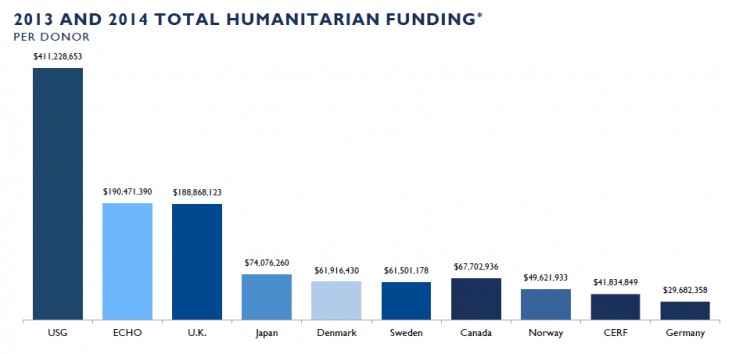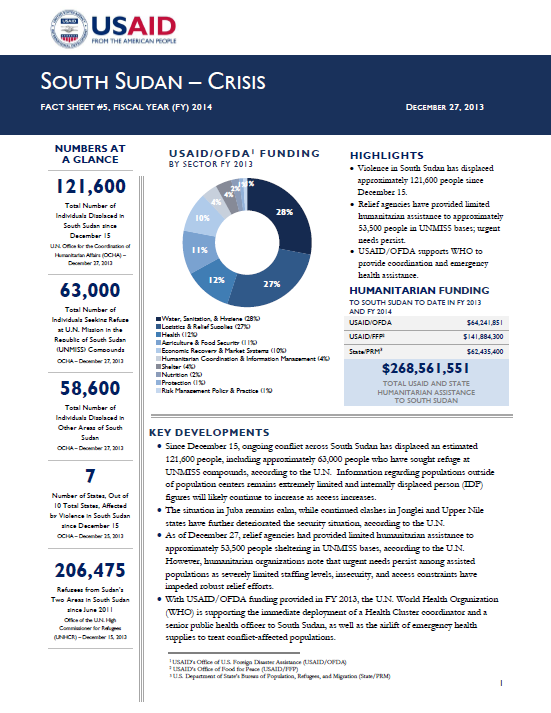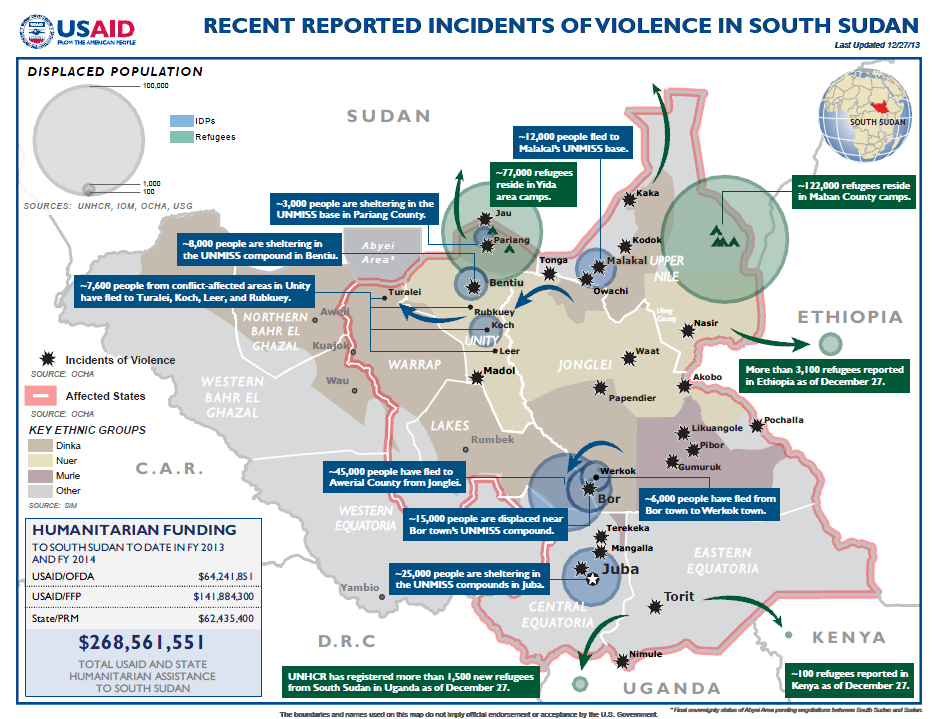- What We Do
- Agriculture and Food Security
- Democracy, Human Rights and Governance
- Economic Growth and Trade
- Education
- Environment and Global Climate Change
- Gender Equality and Women's Empowerment
- Global Health
- Humanitarian Assistance
- Transformation at USAID
- Water and Sanitation
- Working in Crises and Conflict
- U.S. Global Development Lab
Speeches Shim
February 21, 2014
Numbers At A Glance
716,500
75,400
641,100
166,900
233,300
Humanitarian Funding:
To South Sudan To Date In FY2013 and FY2014:
| USAID/OFDA | $87,174,812 |
| USAID/FFP | $141,884,300 |
| State/PRMDoD | $94,735,400 |
| TOTAL | $323,794,512 |
Highlights
Recent clashes in Malakal town, Upper Nile State, and related inter-communal violence within the local UNMISS base resulted in at least 17 deaths and wounded approximately 150 people, according to the U.N.
Humanitarian actors are pre-positioning food commodities and relief supplies in advance of the April-to-August rainy season.
KEY DEVELOPMENTS
Fighting has resulted in increased population displacement in recent days, with violence displacing more than 883,000 people—including both internally displaced persons (IDPs) and refugees fleeing to neighboring countries—since December 15, according to the U.N.
Escalating insecurity continues to impede consistent, life-saving humanitarian support in conflict-affected areas of South Sudan, particularly in Upper Nile, where fighting between Government of the Republic of South Sudan (RSS) forces and opposition groups has hindered humanitarian operations in Malakal. Population movements continue in Malakal, with many IDPs seeking protection at the UNMISS base, while other people have fled the UNMISS base for areas of greater security.
In an effort to coordinate relief activities for displaced populations and expand emergency assistance where possible, humanitarian organizations continue to focus efforts on pre-positioning of food supplies and relief commodities prior to the upcoming April-to-August rainy season, which will likely impede humanitarian access to populations in need through
October.
The U.N. World Health Organization (WHO) reports that the number of measles cases has declined in all major IDP sites in South Sudan during the week of February 17, with 71 reported cases compared to nearly 172 cases reported the previous week. Despite improvements, measles remains a significant public health concern in conflict-affected areas.
SITUATION, DISPLACEMENT, AND HUMANITARIAN NEEDS UPDATE
While relatively stable security conditions persist in many areas of South Sudan, an estimated 716,500 people remain internally displaced, particularly in areas of ongoing conflict, including 129,400 people displaced in Jonglei State, 198,500 people displaced in Unity State, and 121,800 people displaced in Upper Nile.
While distribution of basic food commodities—reaching more than 267,500 people as of February 21—and nutrition supplies continues, more assistance is needed, particularly for people congregating in rural areas who have not integrated into host communities, the U.N. reports.
Insecurity continues to affect communities and impede humanitarian access in Upper Nile, with renewed clashes between RSS forces and opposition groups reportedly erupting in Malakal on February 18. Related inter-communal fighting also broke out within the UNMISS civilian protection area, cumulatively resulting in 17 deaths and injuring approximately 150 people, according to the WHO. International non-governmental organizations (INGOs) working in Malakal report that escalating violence has disrupted humanitarian activities and continues to threaten the security situation for more than 21,000 IDPs currently sheltering at the UNMISS base.
According to an interagency assessment conducted in Bor on February 5, civilians displaced from previous fighting in Bor are not yet returning to the town permanently. Instead, many IDPs are traveling to and from nearby Mingkaman town in Awerial County, Lakes, during the day to salvage household items from areas of origin in Bor. Although recurrent fighting since mid-December did not destroy numerous homes, armed actors and criminal elements have looted personal residences of all food and household supplies. The interagency assessment recommends continued monitoring of the humanitarian situation in Bor as the security situation stabilizes and displaced people potentially begin returning.
Insecurity in Bor and Malakal since December and recent fighting in Jonglei’s Gadiang town, Uror County, has resulted in increased humanitarian needs among IDP and host community populations in Akobo, Nyirol, and Uror counties, Jonglei, according to relief agencies. Local RSS officials reported to interagency assessment teams that approximately 7,500 displaced families are sheltering in Walgak town, Akobo; more than 1,900 households are sheltering in Waat town, Nyirol; and more than 1,100 IDP households are sheltering in Mwot Tot town, Uror. Previous poor harvests and the strain of IDPs assimilating into host communities have exhausted food stocks in the towns, while interagency teams report increased levels of disease outbreak and limited pharmaceutical supplies in the area. As a result, priority humanitarian needs include food, health, nutrition, and water, sanitation, and hygiene (WASH) assistance. The response to vulnerable populations in Uror is particularly urgent as the upcoming April-to-August rainy season will render much of the county inaccessible by road and air by the end of May.
Disease outbreaks due to overcrowding remain a serious concern among conflict-affected populations particularly in the UNMISS base in Tong Ping, Juba town, Central Equatoria, and other IDP sites in Jonglei, Unity, and Upper Nile.
South Sudan Crisis Fact Sheet #29 February 21, 2014 ![]() (pdf - 375k)
(pdf - 375k)
South Sudan Crisis Map February 21, 2014 ![]() (pdf - 957k)
(pdf - 957k)
HUMANITARIAN RESPONSE ACTIVITIES
Although humanitarian organizations have reached approximately 302,500 people with humanitarian assistance since hostilities erupted on December 15, relief agencies have not fully met needs among assisted populations due to insecurity and a lack of sustained, predictable access, according to the U.N.
The Camp Coordination and Camp Management Cluster has established humanitarian hubs in key locations to facilitate humanitarian assistance for conflict-affected and displaced populations, including new sites in Awerial County, Lakes State, and Bor town, Jonglei State. The hubs, which provide crucial office and accommodation space for humanitarian staff, enable aid workers to establish a longer-term presence and thereby facilitate the provision of more consistent and substantial assistance to nearby conflict-affected populations. With four humanitarian hubs now operational in Awerial, Juba, and Bor, relief agencies are working to establish additional hubs in Bentiu town, Unity, and Malakal to support emergency relief efforts, as well as help alleviate space constraints in UNMISS bases.
According to the U.N., nearly 30 percent of sites hosting displaced populations are currently situated within known flood-risk areas, placing approximately 274,700 IDPs at risk of contracting cholera and other diseases. In response, relief organizations continue to pre-position vital relief supplies, including cholera kits, in areas where flooding is likely during the rainy season. To assist in reducing the occurrence of measles and other prevalent diseases, WHO also continues to support health promotion activities in IDP camps throughout South Sudan.
IDPs, returnees, and host communities in Malakal and Renk towns, Upper Nile, and Bentiu town are receiving emergency health services through mobile clinics supported by USAID/OFDA partner IOM. In addition, WHO supported the delivery of essential drugs and medical supplies to provide health services for displaced people in Mayom, Abiemnom, and Pariang counties in Unity.
Central Equatoria
Relief agencies continue efforts to meet urgent humanitarian needs among vulnerable populations by providing emergency WASH supplies and protection assistance. In coordination with local organizations, INGO Oxfam is providing nearly 13,500 people with safe drinking water and has installed nearly 178 new latrines and bathing shelters at the two UNMISS sites—Tong Ping and U.N. House 3—in Juba. In addition, locally trained protection workers recently provided community outreach and education on gender-based violence to approximately 160 people and psychosocial support to nearly 120 women and girls in the UNMISS bases in Juba.
Although the number of reported measles cases in Juba has reduced in recent weeks, the U.N. Health Cluster—the coordinating body for humanitarian health activities, comprising U.N. agencies, non-governmental organizations, and other stake holders—reports that health actors continue health promotion interventions in Juba IDP sites following repeated cases of measles in Tong Ping and threats of potential disease outbreaks due to poor hygiene and sanitation conditions.
Through the IOM-managed Rapid Response Fund, USAID/OFDA is providing nearly $189,000 to support additional health and WASH interventions, as well as humanitarian coordination and information management and logistical services, in Juba. In response to the ongoing health and WASH needs among IDPs sheltering outside the two UNMISS sites in Juba, INGO People in Need is providing basic emergency health care, implementing vaccination campaigns, and addressing urgent sanitation needs through the provision of safe drinking water, basic hygiene kits, and personal hygiene promotion for conflict-affected and displaced populations.
Jonglei
Currently, humanitarian actors are distributing additional food relief to vulnerable populations in Lankien, Old Fangkak, and Pibor towns, Jonglei, and have provided household kits to approximately 960 families in Waat. Relief agencies have distributed additional emergency relief supplies, including blankets, soap, and household kits, to a total of 3,250 families sheltering in the UNMISS base in Bor.
According to the U.N., UNMISS removed unexploded ordnance (UXO) from two NGO compounds in Bor and surveyed 15 other humanitarian compounds for UXO, with plans to clear the marketplace in Bor next.
Lakes
As of February 20, IOM reached 9,000 households in Awerial with emergency relief supplies and shelter support, while humanitarian organizations provided mine risk education to displaced communities in Mingkaman town, Awerial, according to the U.N.
Oxfam is supporting emergency WASH assistance by providing more than 541,000 liters of safe drinking water per day and constructing latrines and hand-washing stations in Awerial. Nearly 23,000 people have received personal hygiene education.
Unity
As the security situation continues to improve in Bentiu town, health actors are providing reproductive health care services, including obstetric care and emergency services, to people displaced in Bentiu. In addition, the U.N. Mine Action Service recently cleared five humanitarian compounds of possible explosive remnants in Unity.
OTHER HUMANITARIAN ASSISTANCE
As of February 20, international donors have provided approximately $225 million—or 17.7 percent of the $1.27 billion total requested funding—to support humanitarian activities through the South Sudan Crisis Response Plan. Although relief agencies have received an additional $19 million in pledges, the U.N. reports that additional funding is needed to quickly implement life-saving services and secure relief commodities for all core pipelines.

*Funding figures are as of February 21, 2014. All international figures are according to OCHA’s Financial Tracking Service (FTS) and based on international commitments during the 2013 and 2014 calendar years. USG figures are according to the USG and reflect the most recent USG commitments based on the 2013 fiscal year, which began on October 1, 2012, and ended September 30, 2013, as well as the 2014 fiscal year, which began on October 1, 2013.



Comment
Make a general inquiry or suggest an improvement.